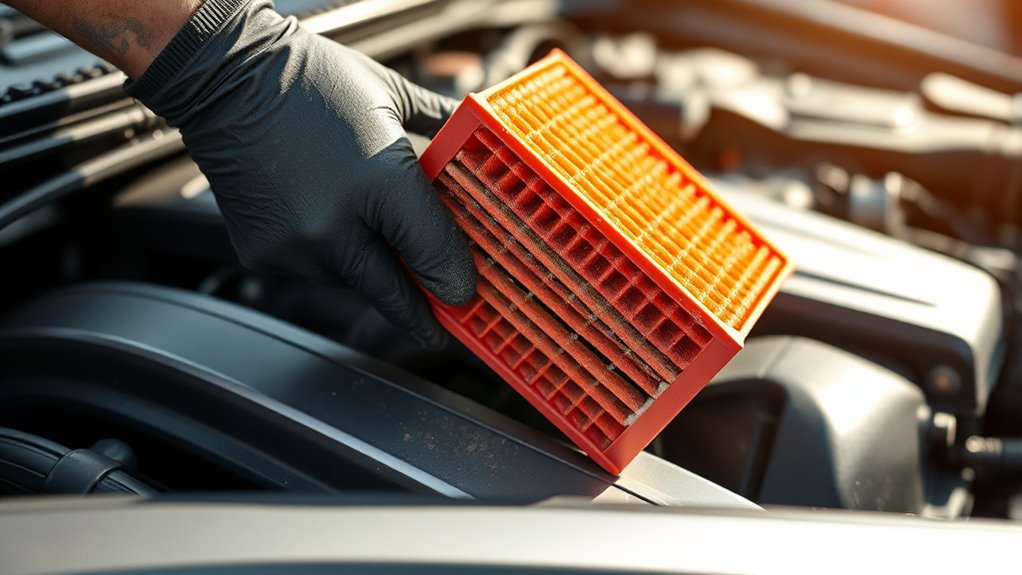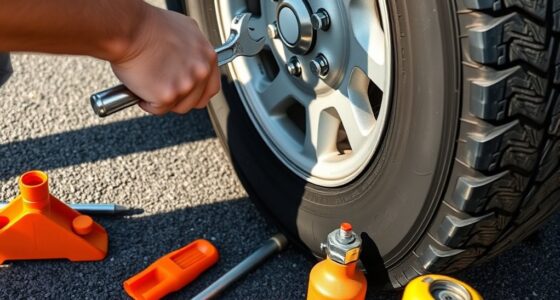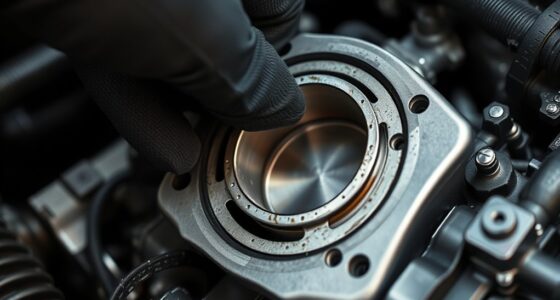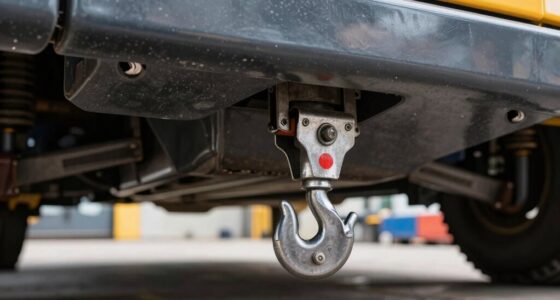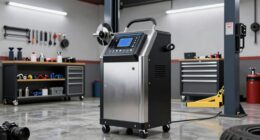To check your engine air filter, open the hood, locate the filter housing, and remove the filter. Hold it up to a light—if you see dirt or debris blocking light, it’s time to replace it. A clean filter helps your engine breathe better, improving performance and fuel efficiency. Regularly inspecting and replacing the filter is straightforward and essential. Keep going to discover more tips for maintaining your vehicle’s health.
Key Takeaways
- Locate the air filter housing under the hood, usually near the engine or intake manifold.
- Remove the air filter from its housing and hold it to a light source to check for dirt or debris.
- Inspect the filter for visible dirt, dust, or debris, and replace if it appears clogged or heavily soiled.
- Reinstall a clean or new filter securely into the housing, ensuring a proper seal.
- Regularly check the filter at intervals between 12,000 to 15,000 miles or sooner in dusty environments.
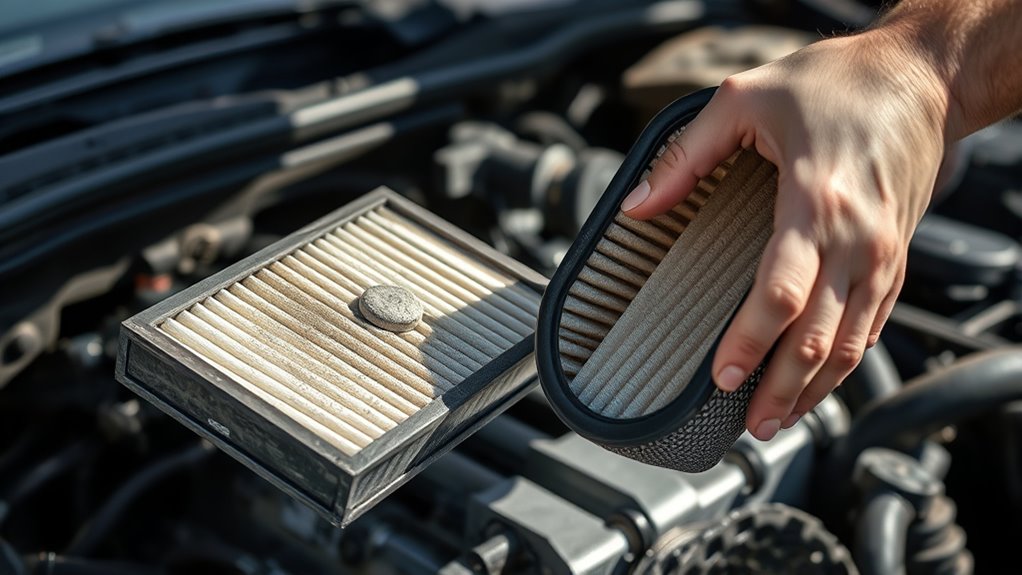
Your engine air filter plays a critical role in keeping dirt, dust, and debris from entering your engine, which helps maintain peak performance and fuel efficiency. Over time, the air filter’s effectiveness diminishes due to constant exposure to airborne particles, making it necessary to monitor its condition regularly. Understanding the air filter lifespan can help you determine when it’s time for a replacement, but it’s equally important to recognize the signs of dirtiness that indicate it’s overdue. Typically, most air filters last between 12,000 and 15,000 miles, but this varies depending on driving conditions and environment. If you frequently drive on dirt roads or in dusty areas, your filter may need more frequent attention.
Most engine air filters last 12,000 to 15,000 miles, but driving conditions may require more frequent replacements.
One of the clearest signs of dirtiness is a noticeable drop in engine performance. If your vehicle feels sluggish, accelerates hesitantly, or struggles to reach normal speeds, your air filter might be clogged. You may also notice reduced fuel efficiency, which occurs because a dirty filter restricts airflow, causing your engine to work harder than necessary. Another indicator is an increase in engine idling roughness or stalling, especially during cold starts. Additionally, if your vehicle’s check engine light comes on, it could be related to airflow issues caused by a dirty filter. Regularly inspecting and maintaining your air filter can also help prevent engine damage caused by dirt and debris.
You can perform a simple inspection to check your air filter’s condition. Open your vehicle’s hood, locate the air filter housing, and remove the filter. Hold it up to a light source; if you can’t see light passing through or if it’s covered with dirt, dust, and debris, then it’s time to replace it. Even if it looks relatively clean, it’s good practice to replace it at regular intervals based on your vehicle’s recommended maintenance schedule. Keep in mind that a neglected, dirty filter not only hampers engine performance but can also lead to more severe damage over time, resulting in costly repairs.
Replacing your engine air filter is a straightforward task that you can do yourself with a few basic tools, or you can have it done during routine maintenance visits. Regularly checking its condition and replacing it when necessary ensures your engine continues to breathe freely, optimizing performance and fuel economy. Remember, a clean air filter means a healthier engine, better mileage, and fewer worries about unexpected breakdowns. Staying proactive with your air filter’s condition is a simple yet indispensable step toward maintaining your vehicle’s longevity and reliable operation.

A-Premium Front Engine Air Filter Compatible with Ford Ranger 2019 2020 2021 2022 2023 2.3L, Replace# EB3Z-9601B, EB3Z9601B
[Vehicle Fitment]: Compatible with Ford Ranger 2019-2023 L4 2.3L—Flexible
As an affiliate, we earn on qualifying purchases.
As an affiliate, we earn on qualifying purchases.
Frequently Asked Questions
How Often Should I Check My Engine Air Filter?
You should check your air filter every 12,000 to 15,000 miles or once a year, depending on your air filter lifespan and driving conditions. Regular maintenance schedule checks help guarantee your engine runs smoothly and efficiently. If you drive in dusty or polluted areas, consider inspecting it more often. A simple visual check can reveal dirt or clogging, prompting you to replace it for peak performance.
Can a Dirty Air Filter Affect Fuel Efficiency?
A dirty air filter is like trying to breathe through a clogged straw—it hampers your engine’s airflow, reducing fuel efficiency. When your air filter reaches the end of its lifespan, it restricts air intake, causing your engine to work harder and consume more fuel. Poor air quality impact and delayed filter replacement can decrease mileage, so checking and replacing it regularly guarantees peak performance and saves you money on gas.
What Tools Are Needed to Replace the Air Filter?
You’ll need basic tools like screwdrivers or socket wrenches to replace your air filter, depending on your car’s design. Check the air filter materials—most are paper, foam, or cotton—and follow recommended replacement intervals, usually every 12,000 to 15,000 miles. Make sure to handle the filter carefully to avoid dirt entering the engine. Having these tools and knowing the materials helps guarantee a smooth, effective replacement process.
Are There Different Types of Engine Air Filters?
Did you know there are over 20 different air filter types? You’ll find options like paper, foam, and cotton filter materials. Each type suits specific vehicles and driving needs, offering varying levels of filtration and airflow. Whether you choose a pleated paper filter or a washable cotton one, understanding these air filter types helps you pick the best for your engine’s performance and longevity.
How Do I Know if My Air Filter Is Clogged?
You’ll know your air filter is clogged when your engine struggles to run smoothly, gas mileage drops, or you notice reduced acceleration. Signs of clogging include a dirty, dusty appearance and decreased airflow. Keep in mind your air filter lifespan—typically 12,000 to 15,000 miles—so regular checks help catch issues early, ensuring your engine performs efficiently and prevents costly damage down the line.

KAX Premium Engine Air Filter, GAF025 (CA4309) Replacement for Murano, Maxima, Pathfinder, QX60, G35 FX35, Altima, Impreza, Filter with Longer Life, Protect and Improve Engine Performance
Compatible List: KAX GAF025 (CA4309) premium engine air filter replacement for Murano V6 (2003-2007,2009-2023), Altima L4 (1993-2006), Altima…
As an affiliate, we earn on qualifying purchases.
As an affiliate, we earn on qualifying purchases.
Conclusion
By staying attentive to your engine air filter, you gently guarantee your vehicle’s well-being and smooth performance. Regular checks and timely replacements act as a quiet safeguard, preventing minor issues from blossoming into larger concerns. Think of it as a subtle act of care that preserves your car’s vitality and efficiency. When you nurture these small habits, you’re gently guiding your vehicle to continue serving you reliably, mile after mile, with grace and ease.

K&N High-Flow Original Lifetime Engine Air Filter: Increase Performance, Premium, Washable: Compatible with 2007-2024 FORD/LINCOLN: Expedition, F150, F250, F350, F450, F550, F560, Navigator, 33-2385
ENGINEERED POWER: State-of-the-art air filter media is designed to increase horsepower and acceleration as well as improve overall…
As an affiliate, we earn on qualifying purchases.
As an affiliate, we earn on qualifying purchases.
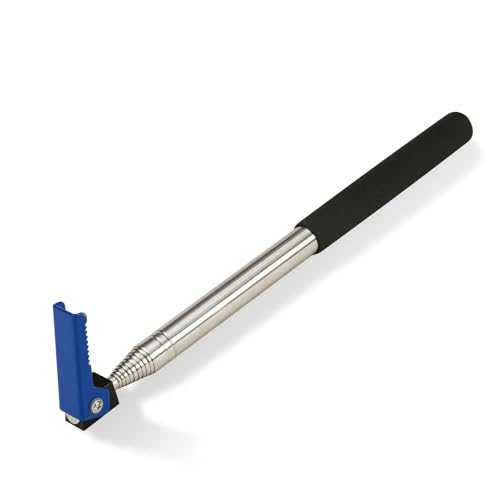
PMTHMPTS FPP-1 FPP1 Telescopic Filter Puller Pusher Tool with Magnet for HVAC Maintenance, Extends 12 Inches to 7 Feet, Heavy-Duty HVAC Air Filter Tool for Technicians and DIY Homeowners
【Telescopic Versatility】FPP1 Filter Puller Pusher Tool adjusts from 12 inches to 7 feet effortlessly, reaching filters in large…
As an affiliate, we earn on qualifying purchases.
As an affiliate, we earn on qualifying purchases.
